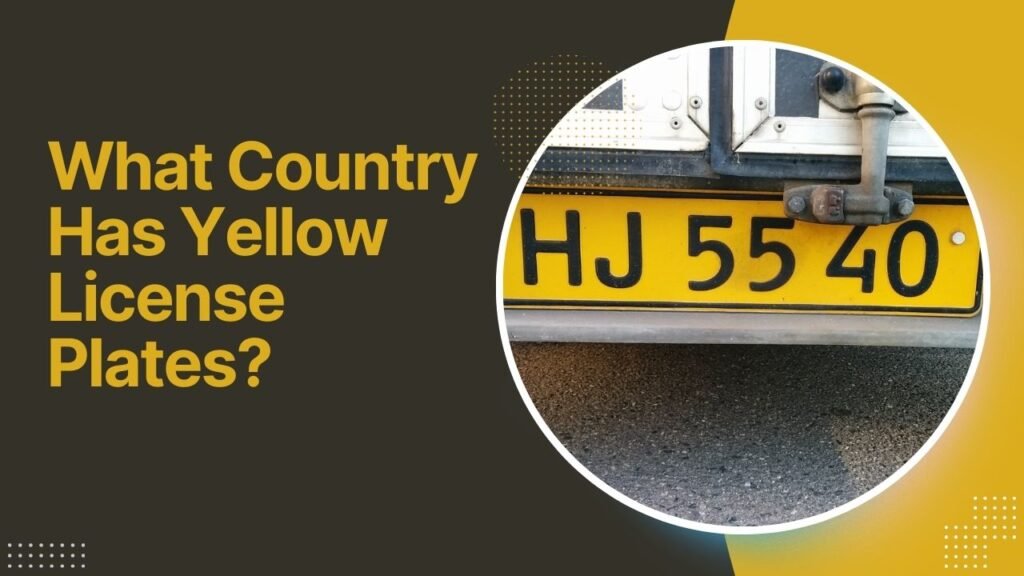Can You Get A Ticket For A Peeling License Plate? Yes, you can get a ticket for a peeling license plate since it must remain legible. Some states may also require you to replace it to avoid fines.
License plates are crucial for identifying vehicles on the road, helping law enforcement maintain safety and accountability.
However, drivers may not realize that a seemingly minor issue, like a peeling license plate, could result in fines or citations.
This article explores whether you can get a ticket for a peeling license plate, why plate readability is so essential, and how to address this issue to stay compliant with legal requirements.
License plate regulations differ by state, yet the requirement for a legible, visible plate remains universal. [Can You Get A Ticket For A Peeling License Plate?]
If a plate is peeling, the numbers may become unreadable, creating challenges for law enforcement to verify the vehicle.
This can lead to ticketing and penalties in some states, often leaving drivers surprised and wondering why such a small problem could cause so much trouble.
Contents
- 1 Understanding Peeling License Plates
- 2 Legal Implications of Peeling License Plates
- 3 Replacing a Peeling License Plate
- 4 Preventing Peeling License Plates
- 5 States with Specific Regulations on Peeling Plates
- 6 Final Verdict: Can You Get A Ticket For A Peeling License Plate?
- 7 FAQs
- 8 Conclusion: Can You Get A Ticket For A Peeling License Plate?
Understanding Peeling License Plates
What is a Peeling License Plate?
A peeling license plate refers to a plate where the reflective coating, printed numbers, or letters have started to deteriorate.
This process makes the plate difficult or impossible to read, especially in low-light conditions. [Can You Get A Ticket For A Peeling License Plate?]
In some cases, the peeling could expose the metal underneath or cause parts of numbers to fade, leaving the license plate unreadable and defeating its purpose in vehicle registration.
Why Do License Plates Peel?
Peeling plates are often the result of environmental exposure, age, or manufacturing defects. Several factors contribute to this deterioration:
- Weather Exposure: Constant exposure to harsh sunlight, rain, and snow can cause layers of the plate’s finish to break down, leading to peeling. [Can You Get A Ticket For A Peeling License Plate?]
- Road Conditions: Salt from winter road treatment, debris kicked up by other vehicles, and regular wear from driving can degrade a plate’s surface over time.
- Manufacturing Defects: Sometimes, license plates are manufactured with subpar materials or defective coatings that peel prematurely, leading to problems for drivers who find their plates deteriorating faster than expected.
Legal Implications of Peeling License Plates
Can You Really Get a Ticket for a Peeling Plate?
Yes, in many states, you can receive a ticket if your license plate is peeling. License plates are required to be clear and legible, as their main purpose is to identify the vehicle on the road.
If your plate peels to the point where numbers and letters are unreadable, law enforcement may issue a ticket to encourage replacement.
The goal is to ensure every vehicle on the road can be identified accurately. [Can You Get A Ticket For A Peeling License Plate?]
For example, states like New York have made it clear that unreadable or peeling plates can lead to citations.
The police rely on clearly visible plates for various purposes, from traffic enforcement to crime prevention, so having a legible plate is a legal obligation for all drivers.
In some areas, authorities may use a traffic stop to alert drivers about the need for a new plate, while in others, an unreadable plate can lead directly to fines.
Penalties for Peeling License Plates
The exact penalties for peeling license plates vary depending on state regulations but typically involve one or more of the following consequences:
- Fines: Fines for a peeling license plate range widely, from around $50 to over $200. In some jurisdictions, the amount may increase for repeat offenses or if drivers fail to address the issue promptly. [Can You Get A Ticket For A Peeling License Plate?]
- Repair Orders: In many states, drivers with a peeling license plate may receive a “fix-it” ticket, which requires them to replace the plate within a set period (often 30 days). If drivers fail to comply, they may face additional penalties.
- Possible Vehicle Impoundment: Although rare, in extreme cases where drivers repeatedly ignore citations for an unreadable plate, law enforcement may escalate penalties, which could include vehicle impoundment until the issue is resolved.
These penalties underscore the importance of staying on top of license plate maintenance to avoid unnecessary costs and complications. [Can You Get A Ticket For A Peeling License Plate?]
Replacing a Peeling License Plate
Steps to Replace a Peeling Plate
If you notice your license plate starting to peel, it’s essential to act promptly. The process for replacing a peeling plate typically involves these steps:
- Contact Your DMV: Start by reaching out to your local Department of Motor Vehicles (DMV) office. You can often request a replacement online, over the phone, or in person. [Can You Get A Ticket For A Peeling License Plate?]
- Submit Required Documents: Most states require you to provide proof of vehicle registration and valid identification. This confirms that the vehicle belongs to you and helps prevent fraud.
- Pay Replacement Fees: In most states, a nominal fee applies for replacing a damaged plate. However, some states, like New York, may replace plates for free if the peeling results from a manufacturing defect rather than user damage.
- Install the New Plate Promptly: Once you receive your new plate, ensure it’s properly attached to your vehicle according to your state’s guidelines. [Can You Get A Ticket For A Peeling License Plate?]
Are Replacements Free in Some States?
Yes, certain states provide free replacements if peeling is due to a manufacturing defect. For instance, New York’s DMV offers free replacements for license plates that show premature wear and peeling.
Other states may not offer free replacements but may still allow reduced-cost options under specific circumstances.
If your plate begins to peel, it’s worth checking with your state’s DMV to see if any free or discounted replacement programs are available.
Keeping a well-maintained plate not only avoids fines but also contributes to road safety. [Can You Get A Ticket For A Peeling License Plate?]
Preventing Peeling License Plates
Maintenance Tips
- Regular Inspection: Make a habit of checking your license plates at least once a month for signs of wear or damage. If you spot minor peeling early, you may be able to arrange a replacement before it worsens.
- Use Protective Covers: Clear, non-tinted license plate covers can help shield your plate from road debris and UV exposure. Note that tinted covers may be illegal in some states, so opt for a clear version to stay compliant.
- Avoid Harsh Cleaners: When cleaning your vehicle, avoid harsh chemicals on your license plate, as they can wear down the reflective coating. A mild soap-and-water solution is best for maintaining the plate’s finish. [Can You Get A Ticket For A Peeling License Plate?]
When to Replace vs. Repair
While it may be tempting to use glue or tape to “repair” a peeling plate, this is generally not a viable or legal solution.
Repair attempts may only worsen the issue, and most states require drivers to replace, not repair, any damaged or unreadable plates.
Replacing your plate is the best option for staying compliant and ensuring your plate is fully readable. [Can You Get A Ticket For A Peeling License Plate?]
States with Specific Regulations on Peeling Plates
Some states have established explicit regulations around the condition of license plates, including readability and appearance standards. For instance:
- New York: Requires drivers to replace any plate with significant peeling or fading, offering free replacements if the defect is due to manufacturing.
- California: Enforces strict plate visibility rules; plates must be legible from a distance and without interference from coverings or damage.
- Florida and Texas: Also have regulations enforcing clear, visible plates. Authorities in these states may issue tickets for any plates considered unreadable or obscured.
It’s worth noting that many states also have inspection requirements, and peeling plates may result in a failed inspection, further necessitating a replacement. [Can You Get A Ticket For A Peeling License Plate?]
Final Verdict: Can You Get A Ticket For A Peeling License Plate?
Maintaining a legible license plate is more than just following the rules; it’s a safety measure that benefits everyone on the road. [Can You Get A Ticket For A Peeling License Plate?]
Peeling plates are not just a cosmetic issue—they can lead to misunderstandings, misidentifications, and ultimately, fines or even vehicle inspections.
If you notice your plate peeling, taking action to replace it promptly can save you from tickets and ensure you remain compliant with state laws.
Proactive maintenance is key, especially for drivers in regions with harsh weather or road conditions. By staying vigilant, you can avoid unnecessary fines and help uphold the reliability of vehicle identification systems.
See Also: How Do I Get A Temporary License Plate In Florida?
FAQs
What should I do if my license plate starts peeling?
As soon as you notice peeling, contact your DMV to arrange for a replacement. Acting quickly can prevent the issue from worsening and avoid potential fines.
Can I repair a peeling plate instead of replacing it?
Repairing a peeling plate isn’t recommended and is generally not legally accepted. Replacement is the only compliant solution, ensuring the plate remains fully readable.
Are there any warranties for peeling plates?
Some states offer free replacements if peeling is due to manufacturing defects. Check with your DMV to see if your plate qualifies for a no-cost replacement.
How much does it cost to replace a peeling license plate?
The cost of replacement varies by state. Some states offer free replacements, while others charge a small fee, generally ranging from $10 to $30.
Which states enforce penalties for peeling plates?
Most states have regulations around legible plates, but the degree of enforcement varies. Some states, like New York, are particularly proactive in enforcing legibility rules.
Conclusion: Can You Get A Ticket For A Peeling License Plate?
Keeping your license plate in good condition is essential for legal compliance, avoiding fines, and ensuring public safety.
Peeling plates may seem like a minor issue, but they can lead to significant penalties if left unaddressed. [Can You Get A Ticket For A Peeling License Plate?]
Regularly inspecting your license plate and promptly replacing it if peeling occurs will save you from unexpected fines and help keep our roads safe.
Make sure to follow your state’s guidelines and reach out to your DMV for replacement options if your plate starts to deteriorate.

I’m Karsyn Marsh, a blogger from a small village in Texas. I enjoy writing about many topics, and right now, I’m focused on license plates. I share helpful information and facts on LicensePlateFacts.com.



